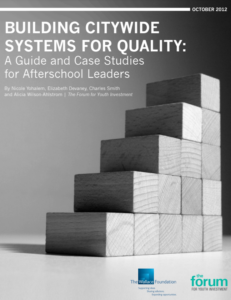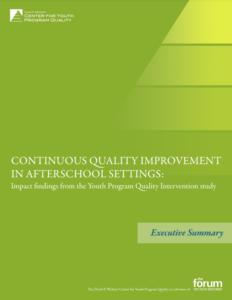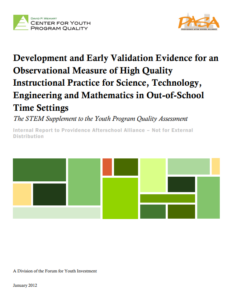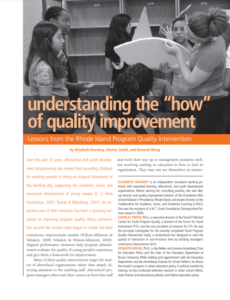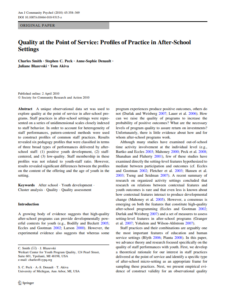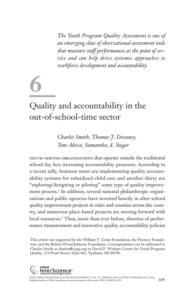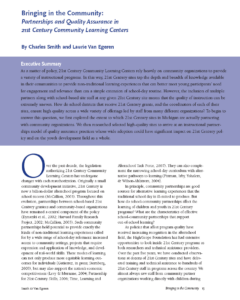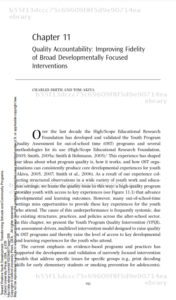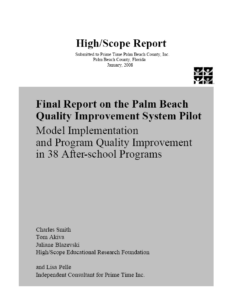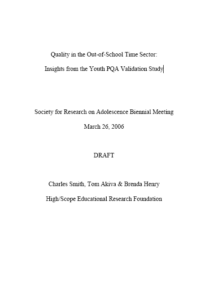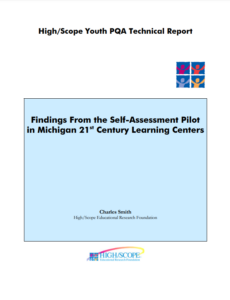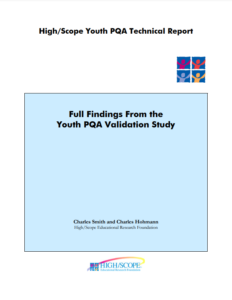FEATURED PUBLICATION
The Multilevel Person in Context ~ neuroperson (MPCn) Model
Guidance for Quality Improvement Systems (QIS) Focused on Socio-Emotional Skill Growth and Transfer Outcomes
In this working paper, QTurn introduces a model for thinking about the development of SEL skills in youth programs. We outline how SEL skills are embedded within the wider context of policy decisions, family background, and program quality. The MPCn model also elucidates how SEL skills are related to short-term youth outcomes and long-term youth achievements, such as graduation and employment.

All Publications
This paper uses pattern-centered methods to increase the usefulness of information available from survey-based skill measures, with a focus on using survey-based skills measures to detect skill change over time.
This guide offers case studies that explain how cities and intermediaries can work with afterschool providers across a neighborhood, city, or region to build quality into the programs that are part of an afterschool system.
The David P. Weikart Center for Youth Program Quality conducted a three year intervention study to examine the Youth Program Quality Intervention (YPQI). The YPQI is a data-driven continuous improvement model for school and community-based sites serving youth during afterschool hours.
This report describes the process of development of the STEM supplement to the Youth Program Quality Assessment and preliminary reliability and validity evidence based on data collected during The Afterzone Summer Scholars program sponsored by the Providence After School Alliance (PASA).
Case study of scaled QIS implementation in Rhode Island with focus on manager skills and implementation at the organization level.
This paper uses pattern centered methods to identify three different quality profiles (high, medium, and low) that characterize staff instruction in out-of-school time programs.
This paper uses pattern centered methods to describe the association between the quality of instruction available and youth’s level of mental engagement with that instruction.
In the fragmented OST sector, defining and measuring quality in terms of staff behaviors provides a common framework that can reduce obstacles to performance improvement and streamline data-driven accountability. This chapter views the point of service as the critical unit of study because it is ubiquitous across OST programs and because it is the place where key developmental experiences are intentionally delivered.
This paper uses pattern centered methods to describe the association between the quality of instruction available and youth’s level of mental engagement with that instruction.
This paper, published in the Fall 2008 edition of Afterschool Matters: Occasional Paper Series, describes community partnerships in Michigan’s 21st CCLC programs.
This chapter describes the Youth Program Quality Intervention (YPQI), a setting-level intervention model designed to raise quality in out-of-school time programs. The YPQI takes managers and staff from a network of youth programs through a process of identifying and addressing strengths and areas for improvement, using a standardized assessment tool.
A presentation of baseline and post-pilot program quality ratings for 38 after school programs participating in a pilot quality improvement system in Palm Beach County, Florida.
Design theory and formative evidence to describe setting dynamics at two distinct levels, (1) the organization-level where professional learning communities are formed and (2) point-of-service level (e.g., classrooms) where professional staff and learners meet.
Overall 24 sites within 17 grantees participated in the self-assessment pilot study by assembling staff teams to collect data and score the Youth Program Quality Assessment (PQA). Youth PQA data collected using the self-assessment method demonstrated promising patterns of both internal consistency and concurrent validity with aligned youth survey responses.
The original validation study for the Youth Program Quality Assessment (Youth PQA). The Youth PQA was developed to assess the quality of instruction in afterschool and other education settings.



